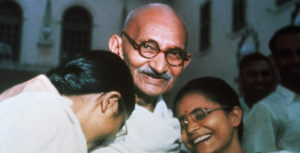India’s reputation as the world’s largest secular democracy has suffered grievously since Narendra Modi’s victory in the general elections of 2014. The first Hindu supremacist to govern with an absolute majority in parliament, he has presided over the subversion of indispensable institutions, from the free press to the election commission. Last week, human rights groups castigated the White House for rolling out the red carpet for Modi’s three-day state visit; the prime minister had been banned in the past from visiting the US “for severe violations of religious freedom” following the deaths of more than a thousand people, mostly Muslims, in sectarian riots that engulfed Gujarat in 2002, when he was the state’s chief minister.
Today, the Indian prime minister, well into his second term in office and facing elections next year, is accused of condoning pervasive violence against religious minorities, introducing of a stealthy religious test of citizenship, destroying India’s secular character, fostering crony capitalism and criminalising dissent. And yet to ascribe the wretched state of Indian democracy solely to one man is to engage in a form of self-deception. The consolidation of Modi’s authoritarian rule would be inconceivable in the presence of an effective democratic opposition.
Modi’s rise has been facilitated by an opposition that now exists solely to provide subsistence to one family: the Gandhi dynasty, which seized total control of the Congress Party in the Seventies and converted it into a family fief. Despite handing two historic electoral victories to Modi and his Hindu-first Bharatiya Janata Party, the governing apparatus of Congress — the “secular” alternative to the ruling party — has clung religiously to the Gandhis.
The great-grandson of India’s first prime minister, Rahul Gandhi is the seventh member of his family to occupy, formally or informally, the pinnacle of Congress. His conduct radiates an almost feudalistic contempt for his obligations. He has one of the worst attendance records in parliament. Between 2015 and 2019, as Modi subverted autonomous institutions, sanctifying murderous Hindu supremacism and building a cult of personality unrivalled in the democratic world, Gandhi averaged about five foreign trips a month. Virtually every time Modi created an opening for the opposition to push back against the government, Gandhi was abroad, leaving his party without leadership and the nation without an opposition. With the exception of Maha Vajralongkorn, the notoriously dissolute monarch of Thailand, it is difficult to think of another Asian leader who has spent more time away from his country in times of need.
But, then, in March, the scion of the storied Nehru-Gandhi dynasty found himself sentenced to two years in jail on charges of defamation, for mocking Modi’s name in a 2019 speech. Since his punishment met the statutory minimum prescribed in law for disqualification from membership of parliament, Gandhi was served a notice of eviction within 24 hours of the trial. The rapidity with which he was removed was staggering. “I am fighting for Indian democracy,” he declared as he announced his intention to appeal. But far from being a martyr for Indian democracy, Rahul Gandhi is complicit in its slow murder.
Those who have questioned Gandhi’s record and challenged his paramountcy have found themselves stamped upon or driven out of the Congress Party. In 2020, during an important state election in Bihar, Gandhi went away on a Himalayan holiday midway through the campaign. A senior figure who objected to this and faulted the leadership for another Congress defeat was severely upbraided and subjected to disciplinary action. That same year, as defeats piled up in state elections across India, a group of 23 Congress leaders issued a call for internal reform of India’s oldest political party.
The Gandhis retaliated with a scorched-earth response. The reformists were shouted down, bullied, heckled, insulted, told to leave the party and punished in petty and humiliating ways. The party’s politburo tightened the screws with a unanimous resolution to “strengthen” the Gandhis’ control of Congress “in every possible way”, pledging never to permit anyone to “undermine or weaken” their hold on it, and praising them for inspiring “a generation of Indians”.
The degeneration of Congress into a family-run despotism ought to dismay all who claim to be concerned about the state of democracy in India. Congress is more than a political party. It is the institution that incubated Indian democracy. Founded by a Scotsman in 1885 as a forum for the expression of native aspirations in British India, it grew under the supervision of Mahatma Gandhi into the engine of India’s freedom movement. Aspiring democrats in Africa and Asia came to regard it as a model for their own countries. “In the upsurge of anti-colonial and freedom struggles that swept through Asia and Africa in the postwar period,” Nelson Mandela wrote from Robben Island in 1980, “there could hardly be a liberation movement or national leader who was not influenced one way or another by […] the All India Congress”.
Following India’s independence, the values of Congress — secularism, socialism, democracy, neutrality in foreign affairs — became the values of the republic. The reverence for Congress ran so deep that elections were a formality: until the Seventies, the party had no challenger. Then, in 1975, confronting the prospect of disqualification from parliament after being convicted by a lower court of violating election rules, prime minister Indira Gandhi declared a state of internal emergency, suspended the constitution and ruled as a dictator for 21 months.
During this period, internal democracy vanished completely from Congress. As party propagandists produced slogans extolling the prime minister (“Courage and Clarity of Vision, Thy Name is Indira Gandhi”), Indira’s older son, Sanjay, a dropout with no formal title in the government, gangsterised the party machinery by inserting his henchmen into its highest echelons, raided state banks and established a reign of terror. Fixated on “beautifying” the country and curbing the growth of population, he ordered the demolition of Muslim slums, paraded in chains those who defied him, and superintended the forcible sterilisation of 6.2 million men — 15 times the number of men sterilised by the Nazis.
Congress was booted out of office in 1977 when Indira Gandhi, desperate to redeem her standing in the West and assured by her intelligence officers of an easy victory, called a snap election. It was an extraordinary affirmation of Indian democracy as an overwhelming majority of mostly illiterate voters threw out a family that had come to regard itself as a native aristocracy.
Indian democracy opened up to competition; Congress, however, hardened into a hereditary dictatorship. The mystique of the dynasty has hypnotised generations of Westerners. Even during the most violent phase of her dictatorship, Indira Gandhi received praise, rather than rebukes, from figures as ideologically apart as Michael Foot and Robert McNamara. A decade later, when her son Rajiv addressed the US Congress after his administration presided over a pogrom of Sikhs, the Washington Post gushed: “Watching him, you had to believe in genes.” Barack Obama admitted in his memoir to being struck by the “dark, probing eyes” and “quiet, regal presence” of Rajiv Gandhi’s Italian-born widow (and Rahul Gandhi’s mother), Sonia. Her position, Obama wrote, was proof of “the enduring power of the family dynasty”.
Since Indira Gandhi’s defeat in 1977, the British Labour Party, the sister party of Congress, has elected a dozen leaders. Barring a brief interregnum in the 1990s caused by a death in the family, Congress, operating in the most populous democracy on earth, has not known a single leader outside one dynasty. Not even the existential threat to India from Modi’s sectarian rule has been able to galvanise it into democratising itself. Under Rahul Gandhi, it has been reduced to a paltry 52 seats in the Lok Sabha, the 545-seat lower house of parliament.
Last year, as Congress found itself out of power in all but two of India’s 28 states, the party reluctantly agreed to hold a leadership election — the first in nearly a quarter century. Since the electoral college was stacked entirely with voters handpicked by the Gandhi family, Rahul Gandhi chose not to enter the race in the hope of giving it the appearance of a fair contest.
But the election was a farce. The Gandhis nominated a proxy candidate: Mallikarjun Kharge, an 80-year-old subservient acolyte of the family from the southern state of Karnataka. Having spent two decades pitching Rahul Gandhi as the hope of India’s young, Congress picked as his surrogate a man born in the reign of George VI, the last emperor of British India.
Kharge’s opponent in the election was Shashi Tharoor, perhaps the only figure with the oratorical prowess, charisma and profile to rival Modi. As a high-ranking diplomat at the United Nations until 2007, Tharoor oversaw a gargantuan bureaucracy, supervised a complex international relief operation for refugees during the Vietnamese boat people crisis and helped negotiate the end of hostilities in the former Yugoslavia. A late entrant to Indian politics, he won three successive terms to parliament from the communist bastion of Kerala in southwestern India.
Tharoor’s record would make him a frontrunner for the leadership of almost any centrist party in the democratic world. In Congress, however, he was exposed to relentless abuse because he threatened, by virtue of his competence, to eclipse Gandhi. As the campaign got underway, Tharoor, who was among the most passionate advocates of internal reform in Congress, was instructed to withdraw in favour of a “consensus” candidate. When he did not, rumours were circulated to suggest that he was quitting the race. Some leaders took great pains to be seen to spurn him. Others hurled abuse at him. Jairam Ramesh, one of the most powerful functionaries in the party, undermined the election by calling it a “sideshow” even before a vote had been cast. Ramesh, the kind of buffoonish bawler found in every despotic set-up, is emblematic of so much that is wrong with Congress: a self-regarding sciolist who has never exposed himself to a lone popular election in his life and yet wields enormous clout by toadying up to the Gandhi dynasty.
Tharoor was prevented from campaigning in Uttar Pradesh, India’s most populous and politically important state, given voter lists without contact details and denied audience with state leaders of the party, who received Kharge with great fanfare. The unfairness of it all was obscured by the Bharat Jodo Yatra, a so-called “unity march” led by Rahul Gandhi that traversed the length of India as the internal elections happened. The objective of the march was not so much to “unify” India as to burnish Rahul Gandhi’s bruised reputation. He was made the focus of an expensive campaign designed to evoke comparisons with Mahatma Gandhi’s historic Salt March in 1930 against the British Empire.
It all paid off. Kharge was “elected” leader. And his first order of business was to pay tribute to the Gandhis by anointing Gandhi as the party’s prime ministerial candidate in the 2024 general election. Tharoor and his supporters were mercilessly marginalised. In March, a veteran of the Congress Party told me that there was a serious effort underway to make an “example” of Tharoor by stamping on his backers and engineering his defeat in the next general elections.
Congress, built by India’s most revered founding fathers, remains the only political organisation that can rival the BJP’s reach and recognition across India. But its ability to restore democracy to India is being fatally undermined by its preoccupation with preserving dynastic despotism within the party. Its recent victory in the statewide election in Karnataka in southern India — naturally credited to Gandhi’s leadership — has deluded some Congresspersons into the belief that their party is poised to defeat Modi in next year’s general elections, and given rise to an ever more militant contest to display loyalty to the Gandhi dynasty. The result: Congress is arguably more feudal today than it was before the leadership contest.
Democracy is a collaborative enterprise: it cannot last if the opposition abdicates its duty. That’s why the prime minister does not wish to finish off Gandhi — his conviction will eventually be overturned by the higher courts — but wants to revive him, energise him with insults and help make him the sole face of opposition to Modi in the minds of voters. That is his path to winning a historic third term, and making secular democracy in India history. Gandhi, by refusing to vanish, is determined to help him achieve his goal.
Disclaimer
Some of the posts we share are controversial and we do not necessarily agree with them in the whole extend. Sometimes we agree with the content or part of it but we do not agree with the narration or language. Nevertheless we find them somehow interesting, valuable and/or informative or we share them, because we strongly believe in freedom of speech, free press and journalism. We strongly encourage you to have a critical approach to all the content, do your own research and analysis to build your own opinion.
We would be glad to have your feedback.
Source: UnHerd Read the original article here: https://unherd.com/





